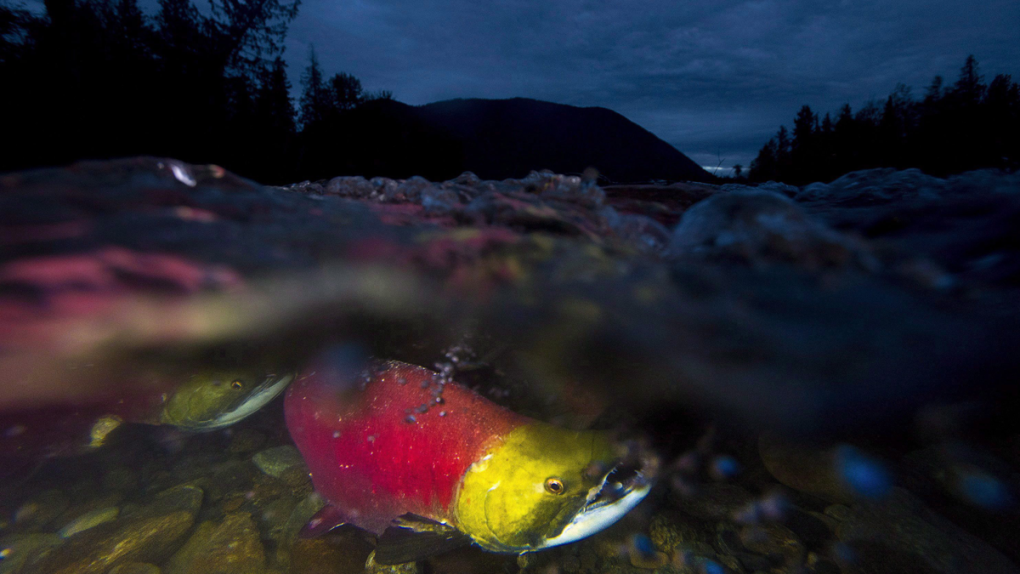B.C. salmon could drastically decline due to extreme temperature events: UBC report
 Spawning sockeye salmon are seen making their way up the Adams River in Roderick Haig-Brown Provincial Park near Chase, B.C., on October 13, 2014. (Jonathan Hayward / THE CANADIAN PRESS)
Spawning sockeye salmon are seen making their way up the Adams River in Roderick Haig-Brown Provincial Park near Chase, B.C., on October 13, 2014. (Jonathan Hayward / THE CANADIAN PRESS)
We’re used to seafood cooked in a pan or barbecue, but researchers say new findings show many ocean species could be heated to death in the ocean.
A new report led by researchers at the University of British Columbia shows scientists have been underestimating the effects of climate change on our oceans and the creatures that dwell within them.
"We haven't put into account these high temperature events,” said William Cheung, director of UBC’s Changing Oceans Research Unit.
The report shows extreme heat events, such as the B.C. “heat dome” in June have not been properly considered.
Scientist now say that with the normal rate of climate change and more frequent extreme heat events, ocean species could face a grim future.
According to the Changing Oceans Research Unit, 77 per cent of all global sea life could decline in the coming decades.
It also found that half of B.C.’s iconic salmon species could be wiped out by 2050.
"Writing has been on the wall now for many years of the lowered levels in our fish-bearing streams and increased temperatures,” said Richard McBride, general manager of the Finest At Sea seafood market in Victoria.
Seafood producers say they have always faced an uphill battle with government restrictions and shrinking catch allotments, and when adding a worsening climate future, their lives become even more difficult.
"Worse and worse every year,” said McBride. “It's getting bad.”
Researchers say their findings will significantly impact the fishing industry, coastal First Nations and communities which rely on the sea.
While the report focused on the future impacts of sea life, an island industry may already be playing the role of canary in the coal mine.
B.C’s Shellfish Growers Association says June’s “heat dome” caused a massive die-off on coastal farms.
According to the organization based in Courtenay, B.C., most producers suffered between 30 to 70 per cent mortality after the blazing sun cooked shorelines.
The heat wave also coincided with a low tide.
"Unfortunately, we understand that we can expect these events to happen more frequently and be more intense,” said Jim Russell with the Shellfish Growers Association. “Not good news for shellfish.”
UBC researchers say if we want to avoid their shocking, and not so distant predictions, two things need to happen.
Government must be able to implement local and up-to-the-hour fishing restrictions to save at risk species. And, the entire planet needs to focus on reducing climate change impacts, which are helping to heat oceans.
CTVNews.ca Top Stories

DEVELOPING Follow live: Notorious killer Paul Bernardo seeks parole
Paul Bernardo, one of Canada’s most notorious killers, is seeking parole at the medium security La Macaza Institution in Quebec. He was transferred there from an Ontario maximum-security prison last year, to significant public outcry.
DEVELOPING Trudeau confirms premiers meeting 'this week,' after Trump makes major Canadian tariff threat
Prime Minister Justin Trudeau will be convening a meeting of all of Canada's premiers 'this week' to discuss U.S. president-elect Donald Trump's intent to impose a 25 per cent tariff on all products from Canada and Mexico on his first day in office, if border issues aren't addressed.
Ontario woman buys van with odometer rolled back almost 100,000 kilometres
An Ontario woman thought she got a good deal when she bought a van for $2,700, but later learned the odometer had been rolled back nearly 100,000 kilometres.
Canada Post strike update: 10 million parcels missed so far as Black Friday approaches
Canada Post says it's missed out on delivering an estimated 10 million parcels as a strike by more than 55,000 workers across the country continues ahead of Black Friday.
Toronto police charge woman in Taylor Swift ticket scam that cost victims $70,000
A Burlington, Ont. woman who allegedly sold fake tickets to Taylor Swift’s concerts in Toronto and scammed fans out of tens of thousands of dollars is facing charges, police say.
Bank of Canada says inflation will fade into background as it settles at 2 per cent
The Bank of Canada on Tuesday said inflation, which has been the center of attention and unhappiness for years amid rising prices, should fade into the background again as the annual rate settled back at 2 per cent.
Victims' families deliver emotional statements at Paul Bernardo's parole hearing
Family members of two teenage girls who were tortured and murdered by Paul Bernardo are asking the Parole Board of Canada to keep the notorious killer behind bars in their emotional victim impact statements.
'Be vigilant': 24 arsons in south Edmonton under police investigation
The Edmonton Police Service now says it is investigating 24 suspicious fires in south Edmonton.
Bah, humbug! Vandal smashes Ebenezer Scrooge's tombstone used in 'A Christmas Carol' movie
If life imitates art, a vandal may be haunted by The Ghost of Christmas Yet to Come for smashing a tombstone that marked the fictional grave of Ebenezer Scrooge in the English countryside.

































